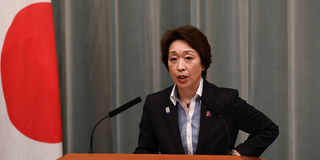Seiko Hashimoto named Tokyo 2020 chief after sexism row

In this file photo taken on September 17, 2020 Japan's Minister for the Tokyo Olympic and Paralympic Games Seiko Hashimoto delivers a speech during a press conference at the Prime Minister's office in Tokyo. Japan's Olympic Minister Seiko Hashimoto has been chosen as the top candidate to replace Tokyo 2020 chief Yoshiro Mori after he resigned over a sexism row, reports said on February 17, 2021.
What you need to know:
- The 56-year-old politician, who was also minister for gender equality and women's empowerment, will replace Yoshiro Mori, 83, after he sparked uproar with claims that women talk too much in meetings
- Hashimoto is a passionate Olympian, who competed at seven consecutive winter and summer Games, in speed skating and as a sprint cyclist, winning a bronze for skating in 1992
- In 2014, she faced a sexual harassment scandal after photos emerged of her hugging and kissing a male figure skater over 20 years her junior
Tokyo
Seiko Hashimoto, who will head the Tokyo 2020 organising committee after a sexism row forced its last chief to step down, is a seven-time Olympian and was one of just two women in Japan's cabinet until she took the job.
The 56-year-old politician, who was also minister for gender equality and women's empowerment, will replace Yoshiro Mori, 83, after he sparked uproar with claims that women talk too much in meetings.
The appointment comes just over five months before the virus-postponed Games, with public opinion in Japan still largely against holding the massive event this year.
Hashimoto is a passionate Olympian, who competed at seven consecutive winter and summer Games, in speed skating and as a sprint cyclist, winning a bronze for skating in 1992.
She has said she was raised being told by her father "'you were born to go to the Olympics'... even before I knew that the Olympics was."
She entered politics in the 1990s and after a period balancing sports and statecraft, her final Games as an athlete was in 1996, and she began to work her way up the ranks of the ruling Liberal Democratic Party.
Following Mori's sexist remarks, Hashimoto said she wanted to hold "thorough discussions" with the Tokyo Olympics boss about his views.
"The Olympics' fundamental principle is to promote women's advancement in sport at all levels and organisations in order to realise gender equality," she said.
But Hashimoto is no stranger to controversy herself.
In 2014, she faced a sexual harassment scandal after photos emerged of her hugging and kissing a male figure skater over 20 years her junior.
Purportedly taken at a booze-fuelled party in Russia's Sochi after the Winter Olympics, the images appeared to show Daisuke Takahashi in the clutches of Hashimoto, head of the Japanese delegation to Sochi.
Takahashi said he regretted the drunken moment but did not think he had been harassed by the married Hashimoto, who apologised for any "misunderstanding" caused by the photos.
'Olympic flame'
Hashimoto was born in 1964 in Japan's northern Hokkaido region, famous for freezing winters and snow sports.
She was born just five days before the opening ceremony of the last Tokyo Olympics and her parents drew inspiration from the lighting of the Olympic flame -- seika in Japanese -- when naming her.
These days she is seen as well connected within the Olympic movement and is politically aligned with Mori, having belonged to his party faction.
But she has not totally abandoned her sporting prowess, as she reportedly still trains regularly and takes protein supplements.
Hashimoto married a parliament guard in 1998, raising eyebrows in political circles, and has six children including three step-children.
She gave birth to her first child months ahead of the Sydney Olympics and opted to name her "Seika", meaning "Olympic flame" to "pass on the Olympic dream that my father gave to me."
In the patriarchal world of Japanese politics, getting married and having a baby in office was not just unconventional but "positively unfathomable", she has said.
"Up to then, giving birth was not even an officially recognised reason for missing a (parliament) session," she said in an interview, describing calls to resign from colleagues who did not believe she could fulfil her duties.
But she juggled family and working life, and lobbied for a parliament creche which opened in 2010, paving the way for other women to follow in her footsteps.
As Tokyo Olympics boss, Hashimoto faces an uphill struggle to convince a sceptical Japanese public the event can be held safely this summer despite the pandemic.
She has called cancellation or another postponement "inconceivable", echoing the sentiments of Tokyo 2020 organisers and the International Olympic Committee.
"For the Games next year, athletes are continuing to work hard in the environments they find themselves in. So I feel we have to hold it at any cost," she said in September.




